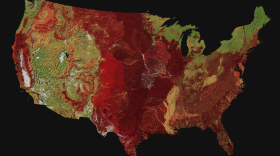
Annie Ropeik
Annie Ropeik reports on state economy and business issues for all Indiana Public Broadcasting stations, from a home base of WBAA. She has lived and worked on either side of the country, but never in the middle of it. At NPR affiliate KUCB in Alaska's Aleutian Islands, she covered fish, oil and shipping and earned an Alaska Press Club Award for business reporting. She then moved 4,100 miles to report on chickens, chemicals and more for Delaware Public Media. She is originally from the D.C. suburb of Silver Spring, Maryland, but her mom is a Hoosier. Annie graduated from Boston University with a degree in classics and philosophy. She performs a mean car concert, boasts a worryingly encyclopedic knowledge of One Direction lyrics and enjoys the rule of threes. She is also a Hufflepuff.
-
There's a history of wildfire across America, a threat made worse by the warming climate. And more people are moving to fire-prone areas without realizing the danger.
-
The warming climate is raising the risk of major wildfires almost everywhere, including in normally wet New England. Forest managers in New Hampshire are alerting residents and stepping up prevention.
-
Deepening drought is raising fears of another bad year for wildfires. It's also expected to trigger more water cutbacks in a number of states.
-
NewsNashua, N.H., expects to be a destination for people migrating away from the coasts and toward lower temperatures. Officials say a pandemic influx has shown the need to plan for that growth.
-
As climate impacts worsen, some people are moving to other parts of the country that they hope won't suffer as much. Town planners in New Hampshire are already preparing for a possible influx.
-
Thanksgiving weekend began and ended with delayed or canceled flights throughout the country. The worst of the weather is now hitting New England.
-
Clean water activists are leveraging their state's crucial position in the presidential primaries to get candidates to take up their issue.
-
Frustrated with federal inaction, states such as New Hampshire, are taking their own measures against a class of pollutants known as "forever chemicals"
-
We take a trip to the top of New Hampshire's Mount Washington to see how a controversial trail has reignited debate over who should get to use, own and profit from the Northeast's highest peak.
-
It's been a year since 1,100 residents of a public housing complex in Northwest Indiana learned they'd have to move due to high levels of lead in their soil. There still are contamination threats.



